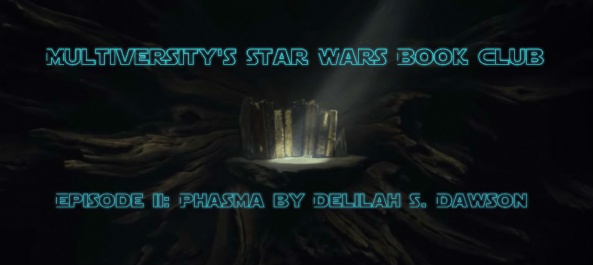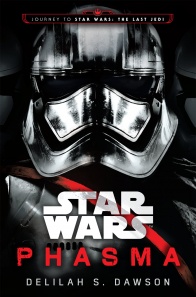Welcome to the Multiversity Star Wars Book Club! Based on a conversation in the Multiversity Slack, editors Matt Garcia and Brian Salvatore decided to start up this column, where we will be reading and discussing a Star Wars every month or so. So come, enter the ancient library and join us!

Written by Delilah S. Dawson
One of the most cunning and merciless officers of the First Order, Captain Phasma commands the favor of her superiors, the respect of her peers, and the terror of her enemies. But for all her renown, Phasma remains as virtually unknown as the impassive expression on her gleaming chrome helmet. Now, an adversary is bent on unearthing her mysterious origins—and exposing a secret she guards as zealously and ruthlessly as she serves her masters.
Deep inside the Battlecruiser Absolution, a captured Resistance spy endures brutal interrogation at the hands of a crimson-armored stormtrooper—Cardinal. But the information he desires has nothing to do with the Resistance or its covert operations against the First Order.
What the mysterious stormtrooper wants is Phasma’s past — and with it whatever long-buried scandal, treachery, or private demons he can wield against the hated rival who threatens his own power and privilege in the ranks of the First Order. His prisoner has what Cardinal so desperately seeks, but she won’t surrender it easily. As she wages a painstaking war of wills with her captor, bargaining for her life in exchange for every precious revelation, the spellbinding chronicle of the inscrutable Phasma unfolds. But this knowledge may prove more than just dangerous once Cardinal possesses it—and once his adversary unleashes the full measure of her fury.
Matt: I’ve seen Phasma referred to as the Boba Fett of the new trilogy and I think I can agree with that. She’s a character who’s a lot more interesting, not to mention intimidating, the less you see of her. And, unlike Fett, she’s actually cool in the films. But never one to look away from a character, LucasBooks has decided it’s time to give us the full backstory of the shiny and chrome First Order trooper. And, I don’t know I don’t want to lead you too much. What did you think of this?
Brian: I think that there is a fundamental problem with the book that has almost nothing to do with Phasma as a character, although we will get to that later. The structure of the book, specifically the first 100 or so pages, with the chapters alternating between the story of Phasma and the circumstances of the telling of that story, is incredibly frustrating.
Matt: This book felt to me like Delilah S. Dawson got the job and dusted off some Mad Max fan fiction. I think Star Wars has the capacity to be a lot of things and try out all sorts of different genres, but there’s a certain feeling and tone you get out of it.
Brian: What is especially weird about that is that the stuff with Cardinal and Vi did feel sufficiently Star Wars-y to me, but just about everything else, with one exception, felt off. Also, Dawson has admitted a Mad Max influence, at least in terms of her writing playlist.
So, let’s start at the beginning. Did the Vi/Cardinal back and forth chapters drive you as nuts as they drove me?
Matt: Yes, in no small part because, like you mentioned, they had that Star Wars feel. Dawson wrote a novella about that spy lady from Force Awakens which I thought came off a lot better, so I know she’s attuned to the Star Wars wavelength. Here, though . . . .
Brian: In addition to that, I feel like every chapter on the ship — until the last 75 or so pages — was Cardinal saying “You’re not telling me enough,” and then Vi saying something like “Well, you needed to know the beginning before I could tell you this . . . .” No matter how good the intervening chapters were, those interruptions were enough to drive me insane.
Those things happen a few times in The Princess Bride, in a far more organic and compelling way, and even then I would get annoyed by them.
Continued belowMatt: The worst part is, the Phasma flashbacks are so boring. If the whole point is to show how Phasma will ruthlessly kill the person who saved her for her own benefit, there had to have been better ways to bring that up. None of the characters were interesting or distinct enough to really care about their plight. The episodic structure was choppy, with some sequences lasting for dozens of pages and others going quickly. Dawson tries to present her as this larger than life supersoldier but no one is ever in enough awe of her or terror from her to really sell that perception. The confrontations are repetitive and feel more like some Call of Duty map rather than a truly effective action set piece. I think, most egregiously, the scene at the end, where they’re mowing down their own tribe, doesn’t have any emotion or impact or insight into how horrible it is to be killing their family. The book mistakes people shooting blasters at each other and running from space beetles as actual drama. I stopped caring altogether around the Thor: Ragnarok sequence but even before that I was dropping in and out.
I think the novel sort of started coming together in the last sequence, when it was strictly on the ship and Cardinal confronted Phasma and Hux. By the time we got there, however, it just lost most of its life.
I guess one question I have is what were we expecting out of a Phasma book? Is she a character who truly warrants her own story?

Brian: See, that’s not up to me to decide. If LucasFilm believes that Captain Phasma is complex enough for an origin story, then it’s up to them to deliver that. [Insert jaded comment on how LucasFilm only cares about money and doesn’t care about the quality of their products outside the films blah blah blah] I think there are valid reasons to consider the character’s origin, as she instantly is two things we had never seen before The Force Awakens: a female Stormtrooper, and one with a fully chrome uniform. While these may not be the benchmarks of a good story on their own, there is an air of mystery to her that could have made for some interesting stories.
Now, I will say that there were a few features of the story I thought could have developed into something interesting. Siv’s role as tender to dead bodies/nutrient harvester was somewhat interesting to me, and the flesh eating beetles and deserted stations were things that could have worked in a stronger story. But when Phasma herself is such a bland, one-note character, no matter how much you gussy up the ancillary plot points, there’s just not that much there.
What’s the shame of this, beyond the fact that the book didn’t live up to the reasonably high standards of the new Star Wars canon, is that the Cardinal/Vi stuff is something I would like to see continued somewhere else. Sure, Cardinal and Finn aren’t too different, but there’s more than one story to be told of a defector, especially a defector from the top of the regime. Or, rather, at least from the top of the Stormtrooper class.
Plus, I’m sure that Armitage Hux is going to remain an important character, if not in the films than in the novels, and Cardinal and the younger Hux certainly have some history that could lead to an interesting story.
Is there something that you were specifically hoping to see in a Phasma story that you felt was missing?
Matt: That’s just it, I’m not entirely certain what I was expecting of a Phasma story going into this. I liked the comic series, for instance, much better, where she was plowing through all these people and creatures to frame some other dude for lowering the shields on Starkiller Base. Maybe it was because we saw her fully formed or maybe it was because Kelly Thompson and Marco Checchetto had a better grasp on what makes her such a machine and the reactions toward her of the other characters.
Or maybe it was because it wasn’t so goddamn long and arduous, that it knew to keep only one storyline going through, and didn’t try to inflate the outcome with meandering wanderlust. The book, as a whole, feels like Dawson is desperately trying to maintain control while never entirely certain how to steer the thing right.
Continued belowAlso, I mean, though LucasFilm may have been the ones to put out the book but we were the ones who decided to read it.
I don’t want to get too far down a Hux tangent because, like you said, he’ll probably have a stronger presence throughout the novels than the films, but I also don’t want to dismiss your points about him, either.
Do you think any of the flashbacks actually paid off with the present-day of the story? Could you see any areas where Dawson was going for something but ultimately missed it? Are there any parts you think she succeeded?
Brian: I think my biggest problem was that, not only did the flashbacks not pay off, I don’t think they even revealed anything new about Phasma. It would be one thing if the book wasn’t great, but revealed a bunch of info that will inform Star Wars as a whole. But that didn’t happen — we now know where Phasma came from, but not much more.
As for what, if anything, Dawson either did well or attempted but missed the mark, I feel like the book had a number of times where it could’ve done far more interesting things, but the biggest ones were both the lack of meaningful relationships for Phasma, and the lack of consequences for anything she did.
Phasma’s cruelty towards her people would’ve made much more sense if we saw her ever be close to anyone, but Siv is the closest she has to a friend/confidant, but even then, you can tell that she’s just using Siv. The relationship with her brother never feels authentic, either. I know the idea is that she’s going to sell her soul for power, but that’s only really affecting if you see what she’s turning her back on.
I would also argue that the droid mining colony section had potential to be really cool, but ultimately fell flat.
Final thoughts?
Matt: Disney and LucasFilm are releasing hundreds of these things. They’re not all going to be winners.
Brian: Well, hopefully our next choice, Canto Bight by Saladin Ahmed, Rae Carson, Mira Grant, and John Jackson Miller, is more of a winner. See ya then!






